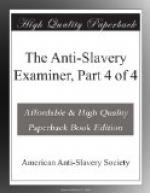4. EXCLUSION FROM THE ARMY AND MILITIA.
The Federal Government is probably the only one in the world that forbids a portion of its subjects to participate in the national defence, not from any doubts of their courage, loyalty, or physical strength, but merely on account of the tincture of their skin! To such an absurd extent is this prejudice against color carried, that some of our militia companies have occasionally refused to march to the sound of a drum when beaten by a black man. To declare a certain class of the community unworthy to bear arms in defence of their native country, is necessarily to consign that class to general contempt.
5. EXCLUSION FROM ALL PARTICIPATION IN THE ADMINISTRATION OF JUSTICE.
No colored man can be a judge, juror, or constable. Were the talents and acquirements of a Mansfield or a Marshall veiled in a sable skin, they would be excluded from the bench of the humblest court in the American republic. In the slave States generally, no black man can enter a court of justice as a witness against a white one. Of course a white man may, with perfect impunity, defraud or abuse a negro to any extent, provided he is careful to avoid the presence of any of his own caste, at the execution of his contract, or the indulgence of his malice. We are not aware that an outrage so flagrant is sanctioned by the laws of any free State, with one exception. That exception the reader will readily believe can be none other than OHIO. A statute of this State enacts, “that no black or mulatto person or persons shall hereafter be permitted to be sworn, or give evidence in any court of Record or elsewhere, in this State, in any cause depending, or matter of controversy, when either party to the same is a WHITE person; or in any prosecution of the State against any WHITE person.”
We have seen that on the subject of petition the legislature regards itself as independent of all obligation except such as is imposed by the Constitution. How mindful they are of the requirements even of that instrument, when obedience to them would check the indulgence of their malignity to the blacks, appears from the 7th Section of the 8th Article, viz.—“All courts shall be open, and every person, for any injury done him in his lands, goods, person or reputation, shall have remedy by due course of law, and right and justice administered without denial or delay.”




